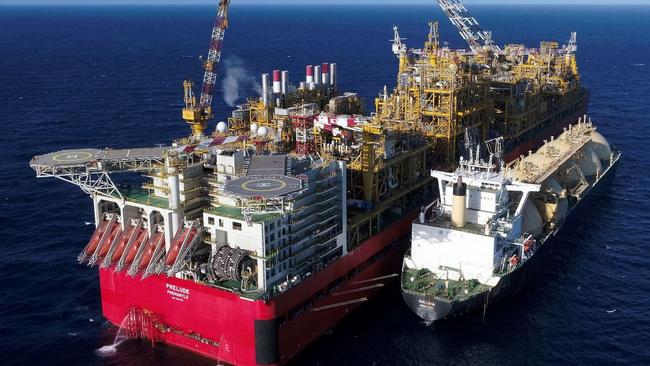Shell plunges to $6bn loss as Covid hits demand and prices
Australia’s leading LNG producers have now blown up close to $25bn in writedowns.

Shell’s Australian arm has plunged to a $US4.9bn ($6.3bn) annual loss after suffering massive writedowns as the pandemic sapped demand and hit prices, the biggest contributor to a near $25bn hit suffered by the nation’s leading LNG producers.
The energy major — one of the nation’s biggest gas producers and foreign investors — was forced to write off $US6.2bn from its Australian operations for the 2020 financial year after the price of crude oil plummeted to a two-decade low last year. That sparked an overall loss of $US4.9bn compared with a $US661m loss a year earlier.
The $US12bn Prelude floating LNG venture off the northern Australian coast was to blame for the bulk of the impairment as Shell cut its oil price forecasts and revised its stance over the “attractiveness” of the venture.
The huge loss is nearly three times bigger than Chevron’s Australian performance after it fell to a $US1.8bn loss in 2020 due to a rout in energy prices and problems at its Gorgon LNG project.
Australia’s LNG sector has now suffered losses of $25bn in writedowns from companies ranging from Shell to Woodside Petroleum, Oil Search and Origin Energy.
The $200bn LNG investment bonanza in the last decade has made the nation the world’s largest gas exporter. Still, many projects have experienced cost blowouts and missed deadlines, cutting returns for big energy producers and dampening the appetite for majors to bankroll a future wave of developments.
Some $US5.9bn of Shell’s $US6.2bn charge for the 12 months to December 31 was due to lowering the value of its exploration and production assets, with Prelude accounting for the bulk of the charge. Three-quarters of the writedown was recorded in the June quarter, with a $US1.32bn loss in the September quarter.
“These impairment losses were primarily driven by reduction in price assumptions and uncertainty in the future economic outlook,” Shell Energy Holdings said in its recently lodged annual accounts.
Shell is one of the dominant players in Australia’s booming energy sector, operating the QCLNG export plant in Queensland and the Prelude floating LNG project off northern Australia along with stakes in Western Australia’s North West Shelf, Gorgon, and Browse LNG ventures and gas business Arrow.
Oil and gas producers endured a turbulent 2020 amid the worst crude crash in a generation. Prices briefly fell into negative territory, leading Shell to cut its forecasts to $US35 a barrel last year and resulting in a $US20bn loss across its global operations.
The gradual reopening of the world’s economies has helped stoke demand and improve the outlook in 2021. Brent crude is now trading at $US66 a barrel and Shell is expected to post a solid profit at its quarterly results on Thursday.
While the annual results do not represent Shell’s total earnings performance in Australia, the records reflect its $617m acquisition of ERM Power and revenues from stakes in the NW Shelf, Gorgon and Prelude LNG projects along with its 50 per cent interest in Arrow Energy.
Shell’s QGC business, scooped up as part of its $US52bn acquisition of BG Group, is not included in the accounts.
Income rose to $US4.2bn for the year from $US3.4bn, while its assets within the company are valued at $US28bn. No dividend was paid, compared with a $US963m return in 2019.
Prelude was touted by Shell as the first of a revolutionary line of projects to unlock stranded gas resources previously considered too remote to support development of conventional land-based LNG plants.
The floating LNG vessel started delivering supplies from the Prelude gas field, 475km north-northeast of Broome, in 2019.
However, the plant had yet to get anywhere near its 3.6 million tonne a year capacity when a number of safety incidents unfolded in early 2020, which were probed by the National Offshore Petroleum Safety and Environmental Management Authority.
Shell earlier appointed former BHP boss Andrew Mackenzie as its global chairman in March, taking over the role at a pivotal moment after it conceded its oil production would slowly decline after peaking in 2019.
Shell had already taken a hit last year after its tie-up with PetroChina was forced into a $520m writedown on their Australian gas business, with losses now topping $8bn over the last decade.
The duo’s Arrow Energy joint venture saw its 2019 net loss slump further to $866m from a $752m a year earlier, with hefty impairment and depreciation costs hitting the Queensland-based energy operator’s result.
Losses since the Arrow venture was formed in 2010 have now reached $8.1bn, or over $12.5bn, when combined with $4.4bn of acquisition costs — including the $3.5bn paid by the two to acquire Arrow a decade ago.
Shell in March kept the door ajar to investing in the delayed $US20bn Browse gas project in WA and remains committed to the ageing NW Shelf LNG plant as it moves to an infrastructure-style tolling model.
The Anglo-Dutch company is undergoing a major strategy shift amid investor pressure to reduce its carbon exposure and step up efforts to tackle climate change.
While Shell’s earnings are dominated by oil and gas currently, it wants to gradually shift the weight of its investment dollars to lower-carbon sources.
That has sparked doubt over whether it will remain a partner in Woodside’s Browse LNG project.




